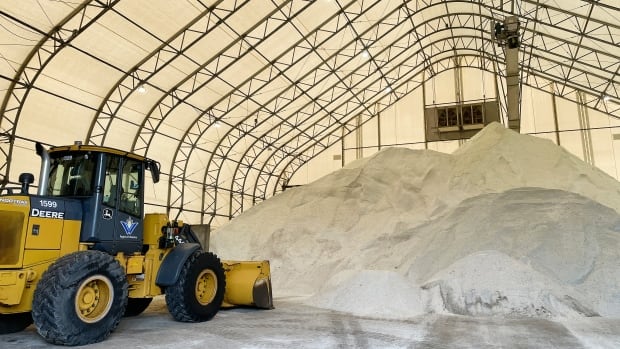Reducing road salt use ‘not something that can wait’ as Ontario lakes see oxygen depletion, researcher says
The move to reduce the amount of road salt during the winter months can’t wait because Ontario’s groundwater and lakes are showing “very rapid salinization,” researchers at the University of Waterloo say.
“We actually use a lot of of salt, and salt is a very effective way to keep roads, sidewalks and parking lots free of ice, and that, of course, is important in terms of ensuring the safety of road users and pedestrians,” said Philippe Van Cappellen, a professor and researcher at the school, as well as the Canada Excellence Research Chair Laureate in Ecohydrology
“But I think it’s also very, very important to be aware that there’s a downside to the use of salt,” he added.
He said previous research has shown groundwater and lakes in Ontario are becoming saltier.
Most recently, Van Cappellen was part of a research group that looked specifically at Lake Wilcox in Richmond Hill. It examined the salinity — the amount of dissolved salt in a body of water — and how it has increased dramatically in the lake over the last nearly 30 years.
As part of the study, which was published this month in the journal Science of The Total Environment, the researchers looked at water chemistry, land use and climate data going back to 1996 along with recent testing of the water.
As the amount of salt in the lake increased, Van Cappellen said, they also saw a depletion of oxygen.
As salinity increases, so does the density of the water, and that makes it more difficult for the lake to “mix,” he explained.
“The mixing of the lake is what really takes the oxygen from the top of the lake — the part that’s in contact with the atmosphere and gets its oxygen from — and to bring that oxygen down into the deeper parts of the lake,” Van Cappellen said.
People, animals and plants need oxygen to survive, and when oxygen is depleted, the only organisms that can survive are microorganisms, Van Cappellen said.
“These microorganisms often produce noxious byproducts.” He said that can create the rotten egg smell that is in the air when hydrogen sulfide is produced by certain bacteria in the absence of oxygen.
“That also limits the amount of the lake that … is habitable for higher organisms such as fish,” he said.
“It’s really something that’s really affecting the water quality, it’s really affecting the biodiversity of the lake.”
Van Cappellen said he wants local municipalities to talk about their road salt use, setting targets such as reducing its use by 25 per cent in the next five years.
“It’s not something that can wait for another 10 years or 20,” he said. “I think it should be an ongoing process.”
‘Right amount in the right area’
Some municipalities have experimented with different ways of deicing roads, sidewalks and parking lots. They include Calgary and Winnipeg, which in the past have used a mixture that includes beet juice, and places in Wisconsin have experimented with cheese brine.
David Pressey, the Region of Waterloo’s manager of transportation operations, said the muniipality has been aware of concerns about the use of road salt and has actively worked to decrease its use.

“We have to ensure that the users of the road are able to get from home to the grocery store and back without incident. So that is our first and foremost concern. The environment is right there,” he said.
“We work with our environmental services team routinely to ensure that we are applying the right amount in the right area and ensuring that we are staying away from those sensitive areas.”
The region will lay down a brine solution when it learns a storm is coming, helping reduce the amount of rock salt spread during plowing.
“Ten years ago, and even 15, 20 years ago, maybe the environment wasn’t first and foremost, maybe the products used were different than today,” he said.
“We’re continually looking and researching for enhanced materials to use that are more effective and more environmentally friendly.”


